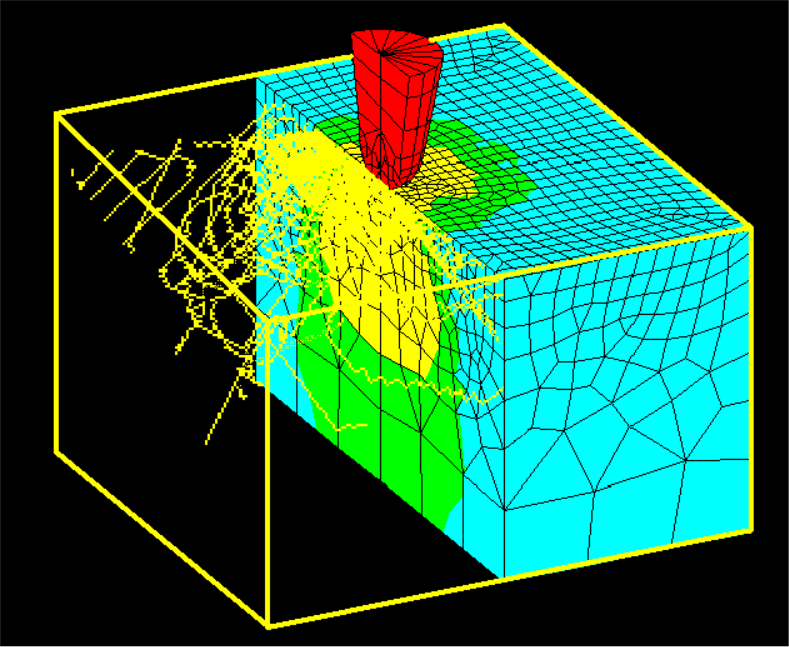GÖRAN GUSTAFSSON
Lectures in Mathematics
June 2 - 4, 2014
KTH, Stockholm
Claude Le Bris
Ecole Nationale des Ponts et Chaussée,
CERMICS

|
GÖRAN GUSTAFSSON Lectures in Mathematics June 2 - 4, 2014 KTH, Stockholm
Claude Le Bris
|

|
|
Abstracts Lecture 1:
Modern materials science: modeling, mathematical theory and computational approaches
The talk, intended for a general audience, will survey some challenging problems, in terms of modeling, theory or computation, in contemporary materials science. A selection of such problems will be presented, each one being both timely and, in a sense, prototypical. Questions such as the coupling of a different descriptions of matter at the atomistic and at the continuum scales, the passage from the microscale to the macroscale, the insertion of uncertainties and heterogeneities in the models, etc, will be examined. We will discuss the interesting issues raised for mathematical analysis (theory of partial differential equations, stochastic processes, homogenization theory) and for numerical analysis (finite element methods, discrete to continuum, Monte Carlo methods, etc). Coffee is served between 12.45 and 1.15 outside the lecture hall.
Lecture 2:
Making stochastic homogenization practical
Lecture 3:
How to deal with nonperiodicity in multiscale problems? Toward a theory of defects.
We will present some recent mathematical and numerical contributions related to nonperiodic multiscale problems. A typical, simple setting is that of a scalar elliptic equation with an highly oscillatory coefficient. The difficulty is that this coefficient is not assumed periodic. It models a structure with a set of embedded localized defects, or a structure that, although not periodic, enjoys nice geometrical features. The purpose is then to construct theoretical settings, and next numerical approaches providing an efficient and accurate approximation of the solution in several possible cases of practical interest. The questions raised ranged from the theory of elliptic PDEs, Calderon-Zygmund operators, homogenization theory, to more numerical issues related to finite element methods. These three lectures are based on a series of joint works with Xavier Blanc (Paris 7), Pierre Louis Lions (College de France), Frederic Legoll (Ecole des Ponts) and several other collaborators.
Claude Le Bris is a professor of applied mathematics at the École Nationale des Ponts et Chaussées (ENPC), Paris. He got his PhD from École Polytechnique in 1993. His research has focused on mathematical analysis and numerical methods for differential equations, with significant contributions in several areas including the mathematics of computational chemistry and physics, multiscale problems and homogenization theory. He has written five books and published more than 110 articles in international journals on these subjects. He has also supervised 16 PhD students. Professor Le Bris has a long list of honors and prizes, which includes the Blaise Pascal Prize 1999 from the French Academy of Sciences, the CS 2002 Prize in Scientific Computing from Communications and Systems, and the Giovanni Sacchi-Landriani Prize 2002 from the Lombard Academy of Arts and Sciences. In Madrid 2006, he gave an invited lecture at the International Congress of Mathematicians. Moreover, he was a Distinguished Ordway Visitor 2008-2009 at the University of Minnesota, the Aisenstadt Chair 2009 at the Université de Montréal, the Charles J. Amick Memorial Lecturer 2009-2010 at the University of Chicago. As a research leader Professor Le Bris holds positions as Civil Engineer-in-Chief and Research Scientist at ENPC, as well as scientific leader of the MATHERIALS research team at INRIA. He is on several advisory boards for international research institutes, and has extensive editorial responsibilities for book series and journals. Sponsored by the Göran Gustafsson Foundation 2014-03-14 |